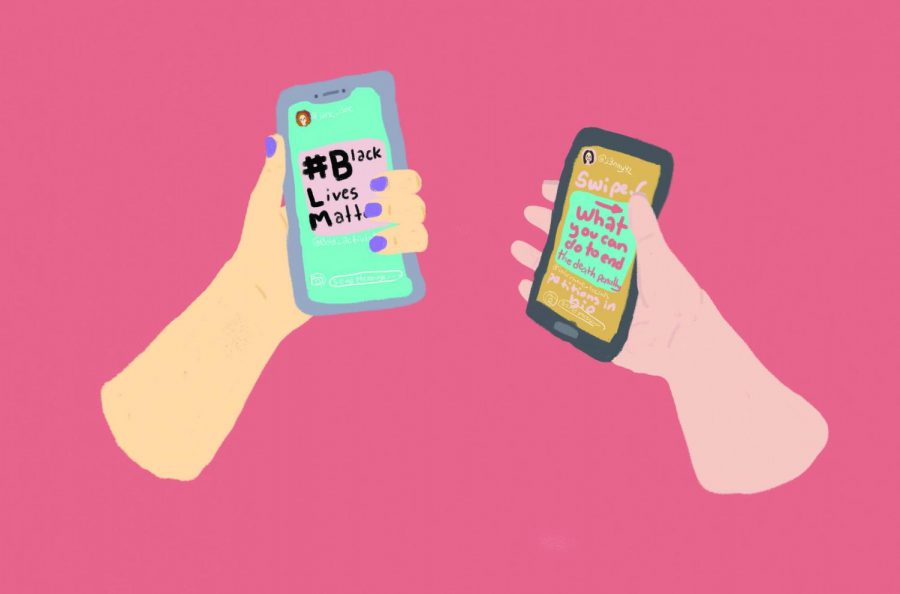Who is your activism for?
What is social media activism and when does it become toxic?
Instagram stories are often full of unhelpful information or solely exist to be used for the poster- which is performative.
April 13, 2021
MAGA, #MeToo, #BlackLives- Matter. Chances are, you’ve seen these hashtags on a social platform, whether it be the home of hashtags, Twitter, Instagram, or even Snapchat where hashtags don’t even work. All three of these are an example of the rise of internet activism also known as Social Media Activism. But it’s no wonder that politics and activism have moved online, a larger audience exists on the Internet such as the teenagers in these very halls. Three grades of students can’t even vote, but if you were to venture into a land of Instagram stories and black screens with detailed paragraphs the owners of these posts belong to no one other than yourself, your friend, or the kid you met at your summer camp, screenshotted over and over again to show support.
In order to understand social media activism, we have to understand what it is: Activism is the action of vigorous campaigning towards a political or social change. This being said, it makes sense that activism has translated from posters and signs to Instagram reposts. This summer, we saw an increase in activism on every platform due to several different events. But the biggest problem with social media is that trends can become fads relatively quickly, and because of the nature of the platforms’ content algorithms, political activism can become a fad in itself, ultimately resulting in performative activism.
Performative activism is defined as: Activism with the wrong intention, instead of trying to spread an idea or message because you believe in it. An example of this is spreading a message to increase one’s social status or to seem cool and trendy and match the “political fad” that is currently trending. How do we avoid reposting something that’s only meant for likes, or being performative ourselves? Junior Gracie Cates, social media director for Northtown’s Women’s Empowerment Club (WEC) and their Young Democrats chapter, has an answer.
“Social media accounts should refrain from posting ‘white savior’, ‘white feminist’ or ‘colonizer’ narratives. All of those topics are subsets of white supremacy. The posts that make the most impact in terms of activism come from groups of people that the account is claiming to advocate for.”
Another helpful tool to fix our online activism is an acronym, “ABCDEF”, which stands for Amplify, Benefit, Call to Action, De-center, Educate and Focus. Your posts should be informative and be about the voices of those that the problem affects. Find out who benefits from the post: Is it just you? Are you telling people something important? What can people do when they see what you’ve reposted? Are you sharing a relevant petition that people can sign, and specifically, is that petition going to do anything? With these criteria being considered, an American-made Change.org petition for a problem in a foreign country probably isn’t helpful, but donating to the Red Cross or signing a petition made in the White House is.
Being involved in politics is important. Today’s politics are going to affect us tomorrow, but when you work to inform others about the information you’re sharing, it shouldn’t create a spotlight on the one who’s sharing it. Make sure the posts you share are helpful instead of, say, simply a black square with a hashtag.



